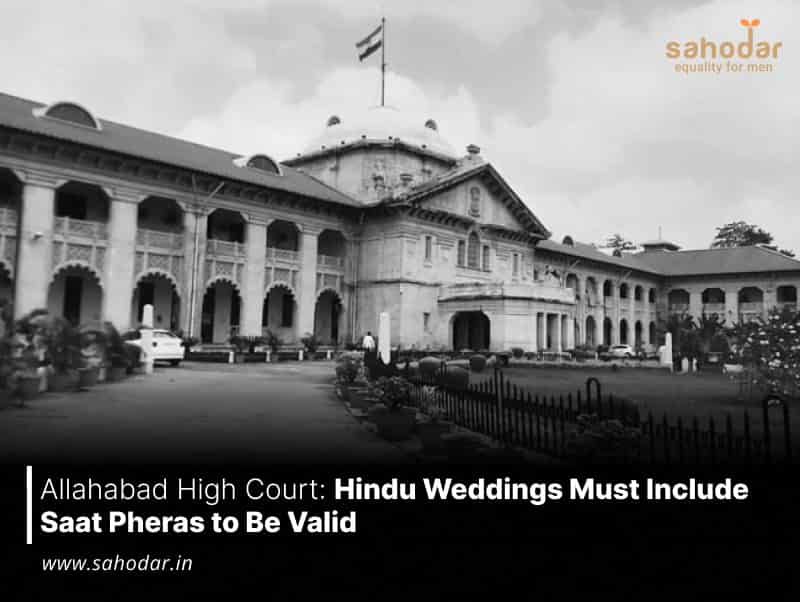The court also relied on the section 7 of Hindu Marriage Act, 1955, which provides that a Hindu marriage may be solemnized in accordance with the customary rites and ceremonies of either party thereto
The Allahabad High Court has rendered a legal opinion asserting that the solemnization of a Hindu marriage lacks legal validity in the absence of the ‘Saptapadi’ ritual and other associated customs. This pronouncement was made within the context of a specific case in which a petitioner alleged that his estranged spouse had entered into a subsequent marital union without legally dissolving their prior marriage through divorce proceedings. Consequently, the court proceeded to dismiss the petitioner’s claims in conformity with this legal principle.
Allowing a petition filed by Smriti Singh, Justice Sanjay Kumar Singh observed, “It is well settled that the word ‘solemnize’ means, in connection with a marriage, to celebrate the marriage with proper ceremonies and in due form. Unless the marriage is celebrated or performed with proper ceremonies and due form, it cannot be said to be solemnized.”
“If the marriage is not a valid marriage, according to the law applicable to the parties, it is not a marriage in the eyes of law. The ‘Saptapadi’ ceremony under the Hindu Law is one of the essential ingredients to constitute a valid marriage but the said evidence is lacking in the present case,” the court said in a recent order.
The court also considered a law called Section 7 of the Hindu Marriage Act, 1955. It basically says that in a Hindu marriage, you can use the customs and traditions of either person. One of these customs is the ‘Saptapadi,’ where the bride and groom take seven steps around a holy fire. When they finish these seven steps, their marriage becomes official and complete.
Observing that a Hindu marriage is not valid without ‘Saptapadi’ ceremony and other rituals, the Allahabad High Court has quashed the proceedings of a case where a man alleged that his estranged wife had solemnised second marriage without divorcing him.
Allowing a petition filed by Smriti Singh, Justice Sanjay Kumar Singh observed, “It is well settled that the word ‘solemnize’ means, in connection with a marriage, to celebrate the marriage with proper ceremonies and in due form. Unless the marriage is celebrated or performed with proper ceremonies and due form, it cannot be said to be solemnized.”
“If the marriage is not a valid marriage, according to the law applicable to the parties, it is not a marriage in the eyes of law. The ‘Saptapadi’ ceremony under the Hindu Law is one of the essential ingredients to constitute a valid marriage but the said evidence is lacking in the present case,” the court said in a recent order.
Powered By
The court also relied on the section 7 of Hindu Marriage Act, 1955, which provides that a Hindu marriage may be solemnized in accordance with the customary rites and ceremonies of either party thereto. Secondly, such rites and ceremonies include the ‘Saptapadi’ (taking seven steps by groom and bride jointly around the sacred fire), which makes the marriage complete and binding when the seventh step is taken.
While quashing the summoning order dated April 21, 2022 and further proceedings of complaint case pending before a Mirzapur court against the wife, the petitioner, the court said, “Even there is no averment with regard to ‘Saptapadi’ in the complaint as well as in the statements before the court, hence, this court is of the view that no prima-facie offence is made out against the applicant as the allegation of second marriage is a bald allegation without corroborative materials”.
In 2017, the petitioner, Smriti Singh, entered into a marriage with Satyam Singh. Subsequently, due to contentious relations, Smriti departed from her in-laws’ residence and filed an FIR alleging harassment for dowry. Following an investigation, law enforcement authorities presented a charge sheet against Satyam Singh and his family.
At a later point, Satyam Singh submitted an application to higher-ranking police officials, leveling allegations of bigamy against his spouse, Smriti Singh. The said application underwent a comprehensive investigation by Circle Officer Sadar, Mirzapur, which concluded that the accusations of bigamy against Smriti were unsubstantiated.
Subsequently, on September 20, 2021, Satyam Singh filed a complaint against Smriti Singh, alleging, among other things, that she had given her consent to a second marriage. In response, the magistrate overseeing the case in Mirzapur issued a summons to Smriti Singh on April 21, 2022. Consequently, Smriti filed the present petition before the high court, challenging both the summoning order and the entirety of the proceedings in the complaint case.
Counsel for the petitioner argued that the said complaint and summoning order were, in essence, retaliatory measures stemming from an FIR previously lodged by Smriti against members of Satyam’s family.

